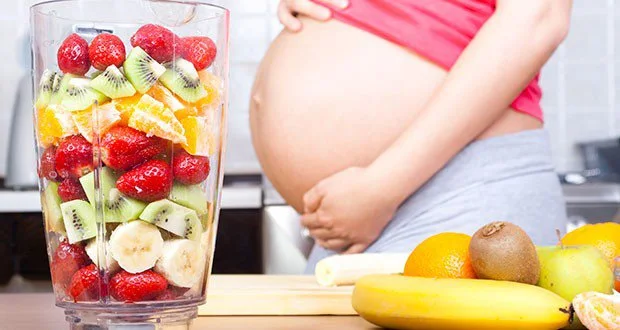 |
| Pregnancy Diet |
During the nine months of pregnancy, the woman's body must provide baby protein, good fats, sugars, vitamins and minerals. In short, all the nutrients and essential elements for a good development. To be able to bring all this, pregnant women must have a rich and balanced diet because their energy and nutrient needs are greater during this period.
To promote normal growth of her baby, not to suffer from fatigue and decreased energy, regain her weight after childbirth, it is imperative to eat well during pregnancy.
Eating well does not mean eating for two, but eating twice as well. Pregnancy is an opportunity to reconnect with good eating habits.
How to Eat Healthy During Pregnancy?
Recommended nutrient intakes vary by maternal physical activity level, but typically range from 2,000 kcal / d in the first trimester to 2,200 kcal / d in the second and third trimester. The pyramid should consist of 15 to 20% protein, 30% lipid and 55% carbohydrate. Below 1600 kcal / day, fetal growth may be compromised.
To meet their own nutritional and baby needs, pregnant women must eat regularly to avoid energy loss, make 3 meals and 2 to 3 snacks per day, and eat a variety of foods (vegetables and fruit, cereal products, milk And substitutes and meats).
Fruit and vegetables
These foods must be tops the list of diets pregnant women because of their wealth of essential nutrients, such as minerals and vitamins. They are also full of fibers.
It is advisable to eat at least one dark green vegetable (broccoli, spinach, lettuce, green beans) and an orange vegetable (carrots, squash, sweet potatoes) per day. Cook them steamed, baked or sautéed in a little olive oil to better retain their nutritional value. For fruits, eat them whole and not in juice sold commercially. These contain a lot of sugar.
Cereals every day
The richness of fiber, vitamins and minerals allows cereals to bring energy and facilitate digestion. A consumption of 200 g of whole grains is recommended for pregnant women. These can vary the pleasures by eating them in the form of whole grains, such as brown rice, oat groats, whole wheat bread, pasta or cooked rice.
Proteins but in small amounts
Pregnant women should eat 2 servings of protein daily. Either 150 g of animal protein (fish, seafood, poultry or lean meat) and 350 ml of cooked legumes or tofu, ½ cup of walnuts and scalded seeds; And 4 eggs. These foods are rich in protein, iron and good fats. Fish is preferred, at least twice a week.
Vegetable oils and little butter and margarine
Not to grow fat, some pregnant women decide not to eat more fat. However, these are absolutely essential to the construction of the nervous system of their baby and to the manufacture of the membranes of its cells. The fetus needs all types of fats without exception. It is enough to emphasize the fats based on unsaturated fatty acids of which the famous omega-3 and to limit the consumption of fats based on saturated fatty acids, present for example in the butter or the whole dairy products.
Foods to Avoid
Biscuits and pastries often contain a large amount of fat and sugar, in addition to being made of white flour. Pregnant women do not have to deprive themselves completely; They can consume them but in moderation. The same applies to sausages which have very high levels of salt and fat.

